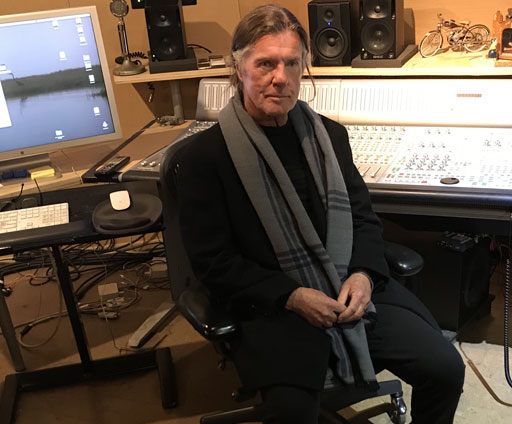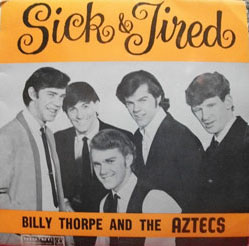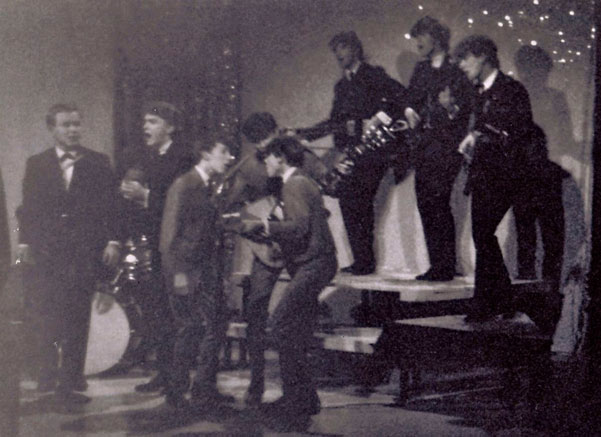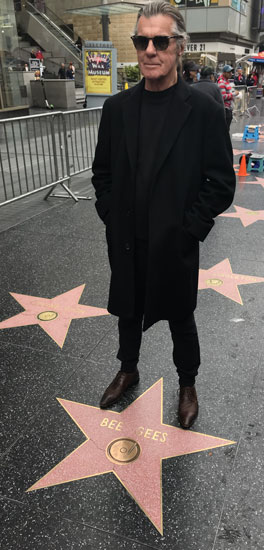THE BEE GEES

Photo by Jonathan Lea
Interview with Vince Melouney
by John Wisniewski
(August 2022)
When we think about the Bee Gees, what comes to mind is probably three brothers named Gibb (hence the name), plus disco, plus many hits. What many people don't know is that after Barry, Maurice and Robin bounced back and forth between the UK and Australia, they started getting hits around the global with an expanded line-up that included guitarist/singer/songwriter Vince Melouney. Like the Gibbs, he made his way from Aussie (born there) to the UK. Along with a drummer, the five piece band were an international phenomenon until the end of the 60's when Robin flew solo and the band broke up soon afterwards. As we all know, the three brothers reformed on their own and had even bigger success. As for Melouney, he became a producer and worked on his own solo material, formed a new supergroup (Fanny Adams), and also reunited and recorded with the Gibbs in the late 70's as did a one-off stadium show with them in Sydney in 1999. Now, he's working on more solo material and has some stories to tell here.
PSF: What was the first band you were in?
VM: My first recording band was called The Vibratones. The Vibratones were an instrumental group- we played surf music which was a big hit at the time, and we actually had a record out. The A-side was called "Expressway" (1963) and was written by my uncle John Melouney, who was a disc jockey in Sydney on 2GB and was sort of managing us for a while. The other side was a cover of The Shadows' "Man Of Mystery" that actually made it into the Top Twenty chart. The Shadows were a big influence on me, I learnt all their tunes. Other influences at that time were the Ventures (they had "Walk Don't Run"), Link Wray, Elvis Presley, Chuck Berry and many more. Tal Farlow was a jazz player I really liked- I learnt a lot from listening to him.
PSF: Could you tell us about forming The Aztecs in 1964 and the material the band was playing?
VM: After The Vibratones broke up, I formed a band, together with John "Bluey" Watson, the bass player in the Vibratones. It took a while to figure out what to call it but looking through books, we came across the Aztecs, so we called ourselves The Aztecs.
The Aztecs were yours truly on lead guitar, John "Bluey" Watson on bass, Colin Baigent on drums, Johnny Noble on lead vocal and Valentine Jones on rhythm guitar. Valentine was a good guitar player but he was a jazz player and we were morphing from surf music into rock and roll and he was not a rock and roller.
I got us a gig at Surf City, which was the major venue in Sydney. It was a huge old theatre at the top of William Street, King's Cross, it was always packed. We used to play about once a week and every Sunday afternoon or something like that. One day, the manager of Surf City, John Harrigan introduced us to this blond-headed fella called Billy Thorpe. He wanted Billy to be the singer in our band, even though we had a singer, Johnny Noble. Johnny came from Newcastle and wasn't crazy about living in Sydney- he was more of a family man, so he took off back home and Billy joined the band.
Not long after this, Valentine left the band and Tony Barber joined. Tony is an Englishman who had recently arrived from England and was living in a hotel opposite Surf City. Billy met Tony and, learning he was a guitar player and wrote songs, brought him along to rehearsals, He got the job. Tony didn't have a guitar and he was left handed. Billy had a Gretsch Country Gentleman so we turned it upside down and changed the strings around and Tony had a guitar. John Harrigan became our manager and all of a sudden we were doing many more gigs and started recording as Billy Thorpe and the Aztecs.
The first songs we released were Tony Barber songs, "Blue Day" with "You Don't Love Me" on the flip side (1964), it got a little airplay. It was our second single " Poison Ivy" (1964) originally recorded by The Coasters, backed with another Tony Barber song, "Broken Things," which went to number one in Sydney. The next single was "Sick And Tired" (1965) which I think was a Top 10 hit followed by "Mashed Potato" which I don't know where that one went and then we had "Over The Rainbow," which went to number one, it was a huge hit for us. We were together for around two years, something like that. We toured all over the country and were a major hit, everywhere we went we gathered a crowd.

PSF: What was it like playing with Tony Sheridan, Heinz and Screaming Lord Sutch? [ED NOTE: this was all circa 1964-1965]
VM: Playing with Tony Sheridan was great. I didn't really know much about Tony before he came to Australia, except that he'd worked with The Beatles. He was a really good guitar player. Unfortunately, he became ill on the tour, so he was not able to do as many shows- I don't remember the exact amount. He was a really nice guy from memory and he made friends with Australian rocker Johnny O'Keefe whilst he was in Australia.
Heinz was also a good guy, a young fellow with blond hair and he was a true performer. He was really good and sang "Just Like Eddie' and his other songs. A couple of the guys in the Aztecs, "Bluey" Watson and Colin Baigent, could get up to mischief sometimes. Heinz had this thing where he'd come to a part in the song and it would go into a guitar solo and he'd disappear off stage and he'd go outside, run around to the front of the theatre and open the door and run down the aisle in the theatre and back on stage and finish the song. One time, "Bluey" and Colin, I don't know how they did it, but they got the door shut so he couldn't open the door so there he was, trying to get into the theatre and it was not a nice thing to do and Heinz was not amused.
Screaming Lord Sutch. David Sutch was his name and he was a really great guy who was always up for a laugh. When we would be on stage and the stage would be really dark, there was a coffin on the stage and we'd play "dun dun dun dun, duh," and the coffin would open slowly and he'd get out, all dressed in black and his face painted white and a top hat and all that. He was really great. He did a crazy trick in Melbourne at the Hilton Hotel, where we were staying. We played at the Entertainment Centre. David had a voice box thing that ran on batteries and had a speaker and a microphone attached to it on a lead. The hotel had, outside your door, a place where you could actually open up and put your rubbish in there. It would go down this chute, right down to the basement of the hotel. David held his box with the speaker and the button over this and made all these crazy noises, yelled and screamed and of course, it vibrated through this whole garbage unit because it was all tin or metal and it just ricocheted, made a hell of a noise. Then he packed it up and put it in his room and went down and complained to the front desk that there was too much noise. He was a crazy guy, a really good crazy guy and a great entertainer. He was a lot of fun.

PSF: Could you tell us about being in the Bee Gees What were the early days of the band like?
VM: I first met the Gibb brothers in Australia- I think we met at a television show. It might have been Johnny O'Keefe's "Sing, Sing, Sing." Actually, there is a photograph around with The Bee Gees, Billy Thorpe and The Aztecs and Johnny O'Keefe all singing "Money (That's What I Want)" so I think I met them there. Everybody was travelling around Australia, and as Australia's such a large country, you don't really bump into too many of your mates who are touring as well.
However, I think I met them there at that show, and then I got to know them a bit better, and we did some recording. They were recording out at Hurstville at Ossie Byrne's studio, which was a nice, comfortable little studio behind a butcher shop. I went out there one day, I can't remember how that came together, but I played guitar on a couple of their tracks and they sang on a couple of my tracks, "Mystery Train" and "I Need Your Lovin' Tonight" which were released as a single (1966). I said to them that I was going to England, that all this great music was coming from England and I wanted to go there and they said they were going as well. So the chances of us meeting up in England were extremely slim- It was about 60 million people. However, it was meant to be, obviously.
I found out through The Easybeats, who were my friends and were in England at the time (they had recorded "Friday On My Mind") that the Bee Gees had just arrived in town and they had a phone number for them. I called up and spoke to Maurice and he said they had been signed by this guy called Robert Stigwood and were doing a recording next week. "Why don't you come and play guitar?" So I said "for sure," and he gave me the address and the times and all that sort of stuff but I didn't have a guitar because I sold my guitar, together with everything I had that was salable, to get enough money to come to England. Harry Vanda of The Easybeats was kind enough to lend me his guitar, his Gibson 335 Stereo, and so I went. IBC Studio , which was just off Oxford Circus, with these huge wooden doors were looking down upon me. I rang the doorbell and was taken upstairs to the studio, that's where I first met (drummer) Colin Peterson.
It was really great to see the guys. We talked about how the trip over was on the boat and all the different things that we had to talk about and catch up on because we were sort of mates. Then we started recording and the first song we recorded was "New York Mining Disaster 1941" (1967). Colin was a very good drummer- he was quite influenced by jazz. A very nice guy- we got along really, really well. They were all really good guys, Barry was like the leader, he'd been looking after his two younger siblings for a long time, traveling around Australia, performing. He wasn't domineering or anything- he was just a little older and wiser, I guess. Maurice was a real fun-maker, always being crazy. He was a real good guy to have around- he created a good vibe and was also a very good musician. Robin was probably the most eccentric of the three, and 'eccentric' is a hard word to explain, but the way that he spoke and the way that he acted, he seemed to be much more English, perhaps a bit more traditional English than the other two lads. He was a great guy, we got along well in the studio. There were a few little arguments between the brothers, which happens in every family. It wasn't until a bit later on that things got slightly out of hand, but the guys were great.
Being a member of the five-piece Bee Gees was, as you would expect, an incredible adventure with mostly ups, a few downs, but mostly ups. It was a different world. We became extremely popular. It was incredible- the right songs, the right band, being in the right place at the right time, all was good. There was a lot of soul in the band- we were really into what we were doing, we were enjoying freedom in the studio to do what we wanted to. Incredible songs like "Harry Braff," "Birdie Told Me," "Indian Gin And Whiskey Dry," "The Change Is Made," "The Earnest Of Being George." There was a bunch of stuff there that was really "off the wall" and it was us doing it. We had that freedom and at the same time, people liked what we were doing and we became more and more popular. It was quite an adventure, I got to say.
PSF: You wrote and sang lead on the track "Such a Shame" by The Bee Gees (on the 1968 album Idea). Could you tell us about this?
VM: I wrote "Such A Shame" and unfortunately, it was not a good time. In The Bee Gees, there was turmoil. Maybe "turmoil" is a bit too harsh a word but it was falling apart and it affected all of us. It wasn't just one particular reason- there were many reasons, you know. In two years, we recorded three albums plus another three albums of songs that were never used or different versions of the songs that were originally released. We were always off to America or Europe to do television shows or to perform. When we were in the UK, we were either in the office doing interviews or in the studio recording. So when I look back at it, I think there were around one hundred-forty tracks that were recorded- I think that's the amount.
I look back and think how did we fit it all in? So, "Such A Shame" is all about that, it was about the beginning of the end. Anyway, I recorded it and the guys really liked the song. As you can hear, it's a very tight, energetic performance. I'm very proud that it's the only song not written by one of the Gibbs that ever got onto a Bee Gees album, which is quite an amazing thing. Barry really wanted to sing it, he really liked the song and he asked whether he could, but I wanted to do it myself. Looking back at it, I would have loved to have heard Barry's rendition of it- I'm sure he would have done a great job.
PSF: Many artists, including Frank Sinatra, covered The Bee Gees songs. What did you think of that?
VM: Yes, it was, of course, incredible to see people like Frank Sinatra, Nina Simone, Elvis Presley and others covering the Bee Gees' songs. The list is long. I was really stoked. It was fantastic and I'm sure Barry, Robin and Maurice felt the same, if not even more so, as they wrote the songs.
PSF: George Harrison visited the studio when you were recording with Ashton, Gardner and Dyke (1969 single "Maiden Voyage"). What was that like?
VM: It took my breath away when I turned around and there was George Harrison. I was producing Ashton, Gardner and Dyke at Apple Studios (the location of The Beatles' final performance, up on the roof) and Tony Ashton and Roy Dyke were friends with George- they'd actually done some work on Wonderwall. George had come into Apple to do something upstairs and they told him that Tony was downstairs in the studio so he came down and Tony introduced me to him. He was very quiet. We spoke of what we were doing, Tony explained to him what was happening then he let us get on with our work. It was a good vibe, a real pleasure. He came into the studio and I got to shake his hand. Fantastic, George Harrison.
PSF: After your time in the Bee Gees, you formed the supergroup Fanny Adams. Who was in the band with you?
VM: I was living out of London, Northwest Seven I think it was, and one day I was down the road doing some shopping and I bumped into Teddy Toi, a New Zealander. I first met Teddy when he came over to Australia, playing bass with a band called Max Merritt and the Meteors, a really great band.
When they broke up, he moved to Billy Thorpe and the Aztecs, but it was after I'd left and the original band had broken up, and so he joined there. I didn't know Teddy all that well, but, you know, to say hello and have a chat, and I bumped into him in the street at Mill Hill. We got talking and I said I wanted to put a band together, and he told me about this guy in Australia called Doug Parkinson, a member of a group called In Focus, they'd had a big hit with the Beatles' song "Dear Prudence." Doug was a really well-known artist and the band were all great musicians, no doubt a fantastic band. I never got a chance to see them so I didn't know Doug. Ted said that there was an Australian band in London at the time and we went over to see them, and strangely enough, they had a 45 record of "Dear Prudence" so I could hear Doug's voice. I really liked his voice and felt that it would fit into what I was planning. I got in contact with Doug and asked him whether he would be interested in coming to London to put the band together and start recording. He said he would definitely come, and he'd take me up on the offer, but the only thing was his drummer had to come with him. His drummer was Johnny Dick, who I knew as he'd come to Australia with Max Merritt and the Meteors as well and he'd played with Billy Thorpe.
So they came to England and we put a lot of rehearsals in, and we recorded one album which was released worldwide by MCA Records (1971). Fanny Adams, for me, was a great band and it was a real shame that things just didn't turn out the way that one would have liked. However, the Fanny Adams album is being reissued later this year on Aztec Records.
PSF: You later wrote two songs with Barry Gibb, "Morning Rain" and "Let it Ride," which haven't come out yet. Could you talk about that?
VM: I think it was 1977, the beginning of '77. I was writing some songs, but I was having a bit of trouble trying to finish them or trying to get them into some shape. I had lots of ideas so I called Barry, and he invited me over, which was absolutely fantastic. It was great to see him again and I also got the chance to spend some time with Maurice and his family, who had a house there on the Isle Of Man as well. I took a little tape recorder and cassettes with many of my ideas and we wrote a couple of songs. Barry listened to the tracks and picked one and that was the first one we did; "Morning Rain." That was the first song that we actually wrote and it was great. Then we wrote another one called "Let It Ride." I still have the cassette from this small recorder placed ten feet away from us. I've been wanting to put the songs out over the years and haven't come across the right time but I'm already working on "Morning Rain" for hopefully a release this year. It will be the first one to come out, and I hope you like it.
PSF What are your future plans?
VM: Well, first of all, the reaction to the three singles that we've had out, "Women," "Ring My Bell," and "Come Some Christmas Eve," which were released in the last 18 months, has been amazing, to say the least. So, at the moment, I'm currently working with Paul Kopf, Jonathan Lea, Alec Palao and Clem Burke [of Blondie] on an upcoming Tall Poppy Syndrome single, which will be followed by another single by yours truly. Also, I would like to mention that the Vince Maloney Sect EP will soon be released on cassette for the first time, in addition to the Fanny Adams album I mentioned earlier, which will be reissued later this year on remastered CD with very detailed liner notes. For information and notifications on these and other upcoming projects, follow my Bandcamp page at vincemelouney.bandcamp.com.

Photo by Theresa O'Donoughue